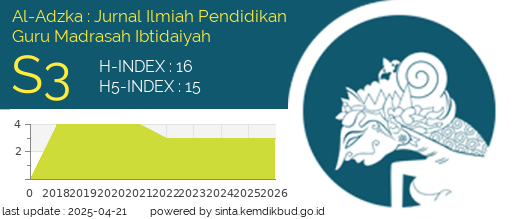Improving Mathematics Problem-Solving Ability With Problem-Based Learning in V Grade Students
DOI:
https://doi.org/10.18592/aladzkapgmi.v12i1.6401Keywords:
problem-solving ability, problem based learning, mathematicsAbstract
Nowadays, the ability of students in solving problems is very important. The teacher as a facilitator must present learning that is interesting and easy to understand. One alternative that can be done is to apply a problem-based learning model. This study aims to determine whether there is a significant improvement in the mathematical problem-solving ability of fifth-grade students of Aisyiyah Metro Elementary School after problem-based learning is applied. This research was conducted using a quantitative research method with the type of experimental research and using a quasi-experimental design in the form of a non-equivalent control group design. The sample in this study was the fifth-grade students of Aisyiyah Metro Elementary School with a total of 37 students divided into 2 classes, namely the experimental and the control class. Data collection techniques in this study used three methods, namely: observation, problem-solving ability tests, and documentation. The results of the study concluded that there was a significant increase in mathematical problem-solving ability in classes using problem-based learning compared to classes using conventional learning.References
Amir, T. (2009). Inovasi Pendidikan Melalui Problem Based Learning. Jakarta: Kencana Prenada Media Group.
Arifin, A.G., (2020). Problem-Based Learning to Improve Critical Thinking. Jurnal Social, Humanities, and Educational Studies (SHEs): Conference Series, 3(4), 98 – 103.
Daryanto, & Rahardjo, M. (2018). Model Pembelajaran Inovatif Model Pembelajaran Inovatif. Yogyakarta: Gava Media.
Hotimah, H., (2020). Penerapan Metode Pembelajaran Problem Based Learning Dalam Meningkatkan kemampuan Bercerita Pada Siswa Sekolah Dasar. Jurnal Edukasi. 8(3), 5-11.
Imami, A. I. (2018). Meningkatkan Kemampuan Pemecahan Masalah Siswa SMP Melalui Metode Pembelajaran Berbasis Masalah. Journal of Mathematic Education and Science. 1(10). 85-89.
Indrijati, H. (2017). Psikologi Perkembangan Dan Pendidikan Anak Usia Dini: Sebuah Bunga Rampai. Jakarta: Kencana
Jamaluddin. (2019). Minat Belajar (Tinjauan Guru Pendidikan Agama Islam). Al-Qalam: Jurnal Kajian Islam dan Pendidikan. 11(1). 1-10.
Jayadiningrat, M.G., & Ati, E.K. Peningkatan Keterampilan Memecahkan Masalah Melalui Model Pembelajaran Problem Based Learning (PBL) Pada Mata Pelajaran Kimia. Jurnal Pendidikan Kimia Indonesia. 2(1). 1-10.
Juarsih, L., Pasaribu, A., & Siahaan, S.M. (2017). Pengaruh Model Pembelajaran Berbasis Masalah (PBL) terhadap Hasil Belajar Fisika Pada Materi Usaha (Kerja) Dan Energi Bagi SMAN 1 Plakat Tinggi. Jurnal Pena Jurnal Ilmu Pengetahuan dan Teknologi. 31(1). 55-66.
Karlina, L., (2019). Problem Based Learning Influence Model and Learning Activities on The Results Of Learning in Primary School. Jurnal Teknologi Pendidikan dan Pembelajaran. 6(2). 106 – 1117.
Noya, A. D. & Susanti. N. A. (2021). Kajian Model Pembelajaran Berbasis Masalah untuk Peningkatan Proses dan Hasil Belajar Pada Bidang Teknik. Jurnal Pendidikan Teknik Mesin. 10(2). 39-47.
Paramartha, G.A.H., Gitakarma, M.S., dan Santiyadnya, N. (2019). Penerpan Model Pembelajaran Berbasis Masalah Untuk Meningkatkan Hasil Belajar Siswa Dalam Mata Pelajaran Perakitan Komputer. Jurnal Pendidikan Teknik Elektro Undiksha. 8(2). 59-67.
Pelu, M. (2019). Application Of Problem Based Learning Model With Variation In The Condition Of Learning Environment (Seating) To Increase Student Learning Activity And Critical Thinking Ability. Jurnal Historika. 22(2). 130-152.
Putri, R. H. & Reinita. (2021). Perbedaan Model Inkuiri dan Konvensional Terhadap Hasil Belajar Tema 3 di Kelas V SD. Journal of Basic Education Studies. 4(1). 237-246.
Raehan., Arizona, K. & Bahtiar. (2020). Penerapan Pembelajaran Berbasis Masalah Untuk Meningkatkan Penguasaan Konsep dan Keterampilan Berpikir Kreatif. Jurnal of Teaching and Learning Physics. 5(1). 35-40.
Rahmawati, D., Sudarmin., & Novi R.D. (2015). Efektivitas Problem Based Learning (PBL) pada Tema Bunyi dan Pendengaran berbantuan Alat Peraga Tiga Dimensi terhadap Kemampuan Berpikir Kritis Siswa SMP. Unnes Science Education Journal. 4(3), 1031-1040.
Septa, H.W. & Dewi, P. S. (2019). Peningkatan kemampuan Pemecahan Masalah dan Disposisi Matematis Siswa dengan Pembelajaran Berbasis Masalah. Mathema Journal. 1(1). 31-39.
Sinar. (2018). Metode Active Learning. Jakarta: Deepublish.
Sudarmin. (2015). Model Pembelajaran Inovatif Kreatif. Semarang: Swadaya Manunggal.
Sudirman. (2020). Efforts to Improve Story Writing Skills Through The Implementation of Problem-Based Learning Strategies in Class XI MIPA 3 Students of SMA Negeri 2 Parepare. Jurnal Istiqra’. 8(1). 1-17
Suprihatin. (2019). Startegi Pembelajaran. Metro: Universitas Muhammadiyah Metro.
Wicaksono, B. & Widiyaningrum, P. (2020). Efektivitas Simulasi Drama Materi Sistem Pernafasan Terhadap Hasil Belajar dan Sikap Kreatif Siswa. Jurnal Phenomenon: Jurnal Pendidikan MIPA. 10(1). 1-14.
Zagoto, S. F. L. (2019). Efikasi Diri Dalam Proses Pembelajaran. Jurnal Review Pendidikan dan Pengajaran. 2(2). 386-391.
Zulfaidhah., Palenewen, E., & Hardoko, A., (2018). Needs Analysis in the Problem Based Learning (PBL) Model Tools and Problems Regarding 7th Grade Students’ Science Learning Outcome at SMPN 2 Bongan. Jurnal BIODIK. 4(1). 48-59.
Downloads
Published
How to Cite
Issue
Section
License
Authors who publish with this journal agree to the following terms:
- Authors retain copyright and grant the journal right of first publication with the work simultaneously licensed under a Creative Commons Attribution 4.0 International that allows others to share the work with an acknowledgement of the work's authorship and initial publication in this journal.
- Authors are able to enter into separate, additional contractual arrangements for the non-exclusive distribution of the journal's published version of the work (e.g., post it to an institutional repository or publish it in a book), with an acknowledgement of its initial publication in this journal.
- Authors are permitted and encouraged to post their work online (e.g., in institutional repositories or on their website) prior to and during the submission process, as it can lead to productive exchanges, as well as earlier and greater citation of published work.












